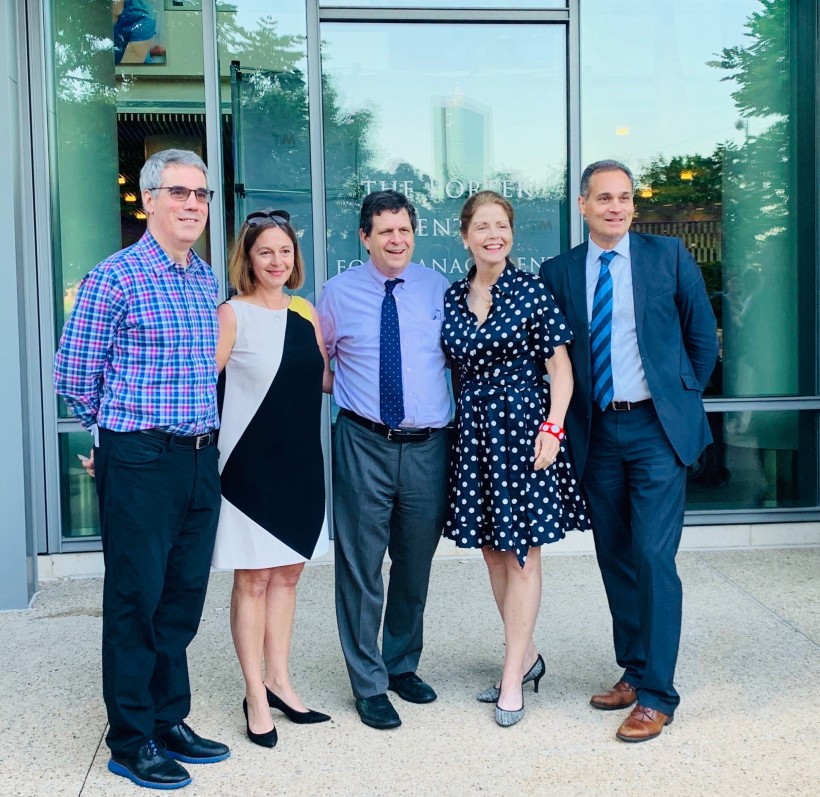Sponsored Content
One of the unheralded benefits of Nova Scotia participating in the Regional Entrepreneurship Acceleration Program was the vast international network it provided. And ONSIDE, the organization that grew out of the REAP experience, continues to capitalize on that web of international relationships.
The network allows ONSIDE to interact with support organizations around the world, and improve the connectivity of Atlantic Canada’s innovation community. It also helps Nova Scotian leaders to understand the gaps in the Atlantic Canadian ecosystem because they can compare it with what’s going on in other parts of the world. That highlights what Atlantic Canada does well and what gaps exist here, and such assessments are part of an ongoing process.
“You become part of a broader community and now you have a huge network and can use their experiences to look at your own ecosystem,” said ONSIDE Chair Chère Chapman in an interview.
The ONSIDE story began in 2016, when a team comprising all components of the Nova Scotia startup community attended the fourth cohort of REAP, the Massachusetts Institute of Technology’s program for regional ecosystems. The Nova Scotia team entered a cohort that included Dubai, Iceland, Lima, Lagos and Madrid.
After the conclusion of the cohort in 2018, the participants decided to form ONSIDE – which stands for Organization for Nova Scotia Innovation-Driven Entrepreneurship – to carry on the work of the REAP team. One component of that mission is to perpetuate relationships with similar groups around the world.
“As we grew, we were wondering how to leverage the relationship we developed with MIT,” said ONSIDE Executive Director Alexandra McCann in an interview. “It gives us access to a global network of other regions and teams who are also doing the same thing as we were. And we wanted to capitalize on [these relationships.]”
There are several facets to the international relations, and it makes sense to start by looking at ONSIDE’s dealings with MIT itself. McCann said Nova Scotia’s REAP team took advantage of its time in the program to understand the ecosystem in the greater Boston area and how it could benefit Nova Scotia. That meant working closely with several organizations in Cambridge, Mass., where MIT is based. These included the Canadian Entrepreneurs of New England, or CENE, a group of Canadian expats who help Canadian startups hoping to target customers in the area.
(The facility that the team worked out of was near the offices of Scale Up Hub: Cambridge, the program developed by Nova Scotia Business Inc. to help scaling companies gain a customer base in the New England market.)
Some of the MIT REAP faculty have visited Nova Scotia to learn more about the ecosystem in this region and offer advice. Bill Aulet, Managing Director of the Martin Trust Center for MIT Entrepreneurship, has worked with a cohort of the Creative Destruction Lab-Atlantic during his visit to Halifax. And Phil Budden, Senior Lecturer in Technological Innovation, has twice addressed senior government officials on innovation. As we all think about recovery post-COVID-19, ONSIDE continues to engage MIT for insight into best practices that could help the province.
The exposure to thought leadership that came with the REAP experience has helped shape ONSIDE’s mission. For example, the team was subjected to studies by the Washington, D.C.-based think tank Brookings Institution, that emphasized the importance of “place-making and connectedness”. McCann said this encouraged ONSIDE to work closely with Nova Scotia’s innovation districts, including the Rural Innovation District, because research has shown that it is important for rural communities to have access to innovation hubs as a means of supporting growth through entrepreneurship.
Then there are connections with the other ecosystems that have gone through the REAP program. With only a population of 960,000 people, Nova Scotia is one of the smaller jurisdictions to have attended REAP. But the province has a strong innovation capacity because of its rich trove of academic institutions. ONSIDE has been able to engage with other REAP participants from around the world. The group has also nurtured relationships with many ecosystems, including Oslo, Israel, Guangzhou, and Melbourne and Queensland in Australia
ONSIDE has been learning from the experiences of other jurisdictions. For example, one group has been doing well at developing innovation-driven companies, but the growth of the ecosystem has been held back because the institutions are not communicating with one another. It illustrated the importance of communication and connectivity.
The ONSIDE team hopes that leaders from other ecosystems have also learned by examining what has been happening in Nova Scotia and Atlantic Canada, and by following the success of our startup community.
Said McCann: “MIT has sort of put Nova Scotia on the map and now all these jurisdictions around the world are contacting us to find out what we’re doing.”
Editor's Note: This is the final article in a series on the origin, philosophy and work of ONSIDE. You can find the first two articles here:
ONSIDE Formed To Carry On the Work of MIT REAP
How Collective Impact Shapes ONSIDE's Mission
About ONSIDE
ONSIDE is a newly established backbone not-for-profit organization that is focused on working collaboratively with stakeholders and partners to galvanize a prosperous Nova Scotia through inclusive Innovation-Driven Entrepreneurship (IDE). It was born out of a two-year engagement, championed by Dalhousie University, with MIT REAP (Regional Entrepreneurship Acceleration Program).












